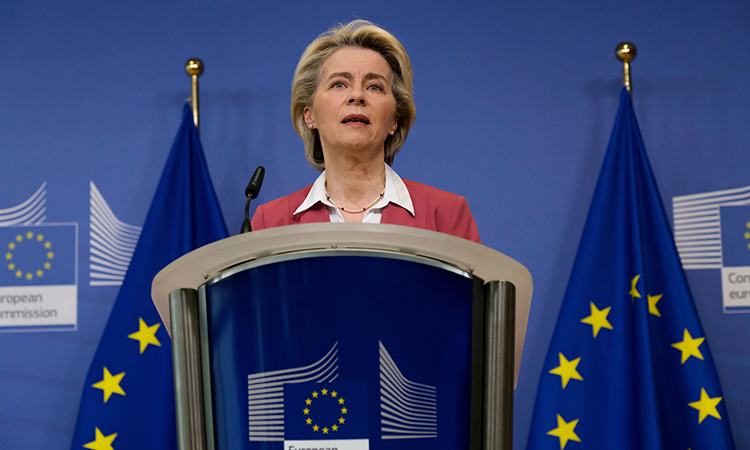Open letter calls on the EC to protect railways from rising electricity prices
Posted: 17 October 2022 | Elliot Robinson (Editorial Assistant - Global Railway Review) | No comments yet
CER have sent an open letter to the European Commission which calls for further measures to safeguard rail from the impact of the ongoing energy price hikes.


President of the EU Commission, Ursula von der Leyen
In an open letter sent by the Community of European Railway and Infrastructure Companies (CER) to the President of the European Commission, Ursula von der Leyen, European rail CEOs called for further extraordinary measures to safeguard rail as the backbone of sustainable mobility and transport in the EU.
In most European countries, railways are one of the biggest single consumers of electricity as 80 per cent of train-kilometres are run on electric energy, a growing portion of which comes from renewable sources. Railways are therefore heavily impacted by the ongoing energy price hike and see their financial viability at risk despite their very high energy efficiency.
According to a survey among CER members on electricity prices, European railway companies are paying up to €420 per MWh in 2022. On average the electricity price has at least tripled compared to 2021, with several countries experiencing a 10-fold increase. As for 2023, many energy contracts need to be re-negotiated and the price forecast in some cases exceeds €500/MWh. As a result, rail costs continue to increase significantly.
It is evident that railways as the backbone of sustainable mobility and transport in the EU are in peril and that fossil-fuel-reliant transport modes are currently gaining a competitive advantage over more sustainable, electricity-based transport modes such as railways, making the EU green transition impossible to achieve.
Related news you will enjoy:
CER calls for strategy to protect affordable energy supply for rail
Leading European rail CEOs meet to define CER’s 2023 priorities
In this challenging situation Europe’s railways need support in order to ensure that the goal of a decarbonised European transport and mobility sector remains achievable. The European railway sector has therefore proposed the following measures:
- Allow rail to benefit from surplus revenues deriving from the application of Council Regulation 2022/1854
- Allow Member States to support railway companies by reducing, waiving, or deferring the payment of track access charges. One way to achieve this could be to prolong Council Regulation 2020/1429 until 31 December 2024
- Include railways in a strategic toolkit for saving energy. Energy-efficient electricity consumers, such as rail, which are committed to decreasing energy consumption without reducing transport services, should receive special treatment when addressed by the energy reduction measures foreseen by Council Regulation 2022/1854 on an emergency intervention to address high energy prices
- Ensure sufficient State aid for rail. The thresholds set in the Temporary Crisis Framework for State aid in the context of the Ukraine war are inadequate for rail as the additional costs for railways are much higher, with some railway companies expecting up to €2 billion in increased annual costs
“We call on the Commission to assist the sector with concrete and necessary measures,” Alberto Mazzola, Executive Director for CER, said. “Member States must be allowed to reduce, waive or defer the payment of track access charges and pursue a holistic approach in introducing demand reduction targets. The sector, which commits to energy savings, must be prioritised along with other services of general economic interest in regards to energy consumption. Sufficient State aid for railways must be ensured and rail made a beneficiary of surplus revenues to reduce the unit cost of rail electricity.”
Stay Connected with Global Railway Review — Subscribe for Free!
Get exclusive access to the latest rail industry insights from Global Railway Review — all tailored to your interests.
✅ Expert-Led Webinars – Gain insights from global industry leaders
✅ Weekly News & Reports – Rail project updates, thought leadership, and exclusive interviews
✅ Partner Innovations – Discover cutting-edge rail technologies
✅ Print/Digital Magazine – Enjoy two in-depth issues per year, packed with expert content
Choose the updates that matter most to you. Sign up now to stay informed, inspired, and connected — all for free!
Thank you for being part of our community. Let’s keep shaping the future of rail together!
Related topics
Funding & Finance, Regulation & Legislation, Sustainability/Decarbonisation
Related organisations
Community of European Railway and Infrastructure Companies (CER), European Commission (EC), European Union (EU)







